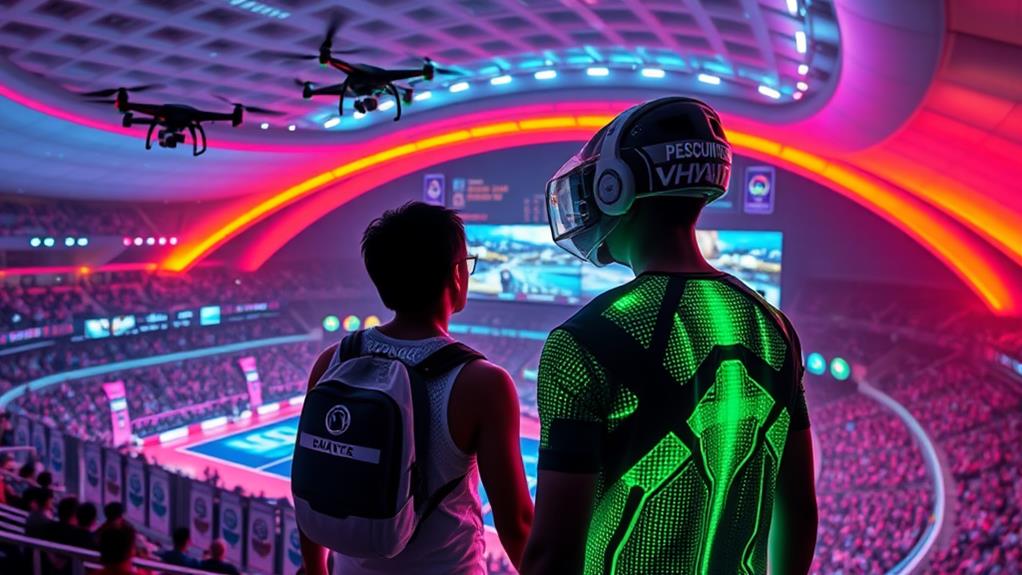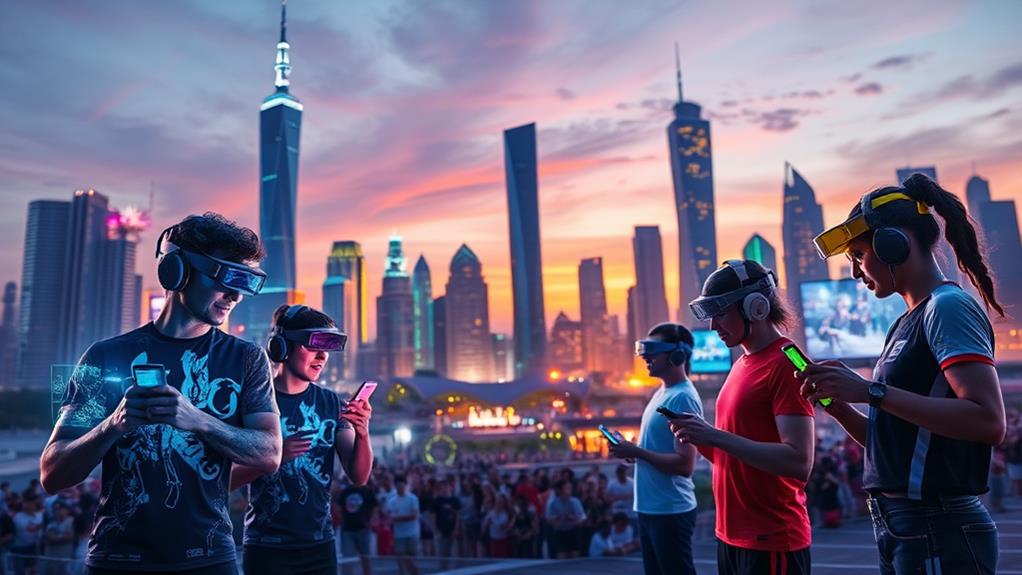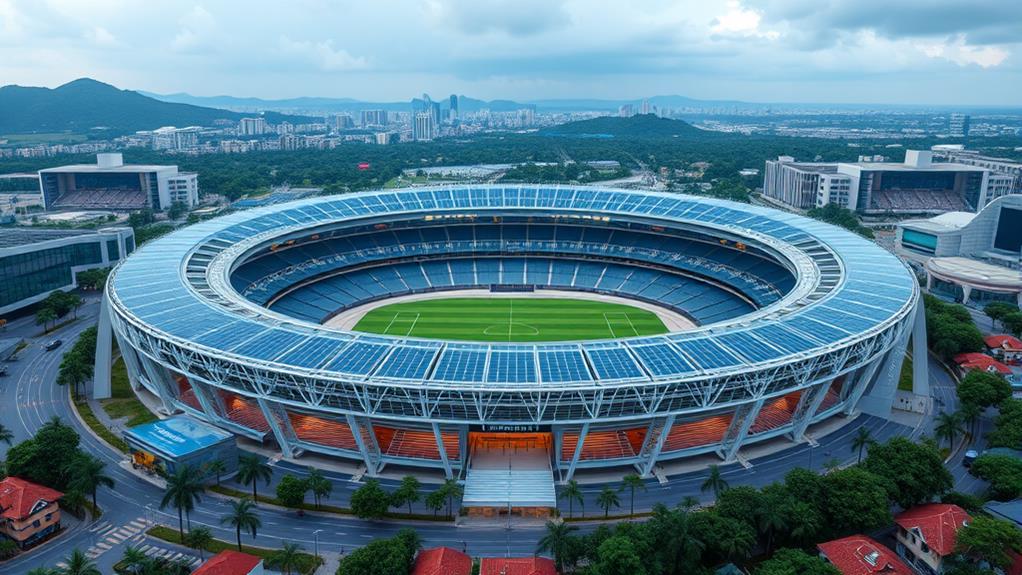The Future of Sports Technology in the Philippines is Promising
The Philippines is poised to experience significant growth in sports technology, driven by the rapid expansion of mobile gaming and advancements in artificial intelligence (AI) and immersive virtual reality (VR) and augmented reality (AR) experiences.
The country's gaming market is projected to reach $1.5 billion by 2025, with over 43 million active gamers.
Data Analytics Will Enhance Player Performance
The integration of data analytics will revolutionize player training and performance. For instance, data analytics can help coaches and trainers identify areas of improvement for athletes, track their progress, and develop personalized training programs.
This will lead to improved overall performance and better decision-making during games.
AI and Machine Learning Will Create Personalized Gameplay
AI and machine learning will transform the gaming experience by creating personalized gameplay for each player.
AI-powered systems will analyze player behavior and preferences, offering customized game modes, difficulty levels, and even personalized coaching. This will increase player engagement and enjoyment.
Cross-Platform Play Will Foster Inclusive Community Participation
Cross-platform play will enable gamers to play with others across different devices and platforms, promoting inclusive community participation.
This will break down barriers and allow gamers to connect with others who share similar interests, regardless of the device they use.
Collaboration Between Tech Firms and Sports Organizations Will Redefine the Landscape
As advancements in sports technology continue, expect increased collaboration between tech firms and sports organizations.
This partnership will lead to the development of innovative products and services, further blurring the lines between sports and technology. Stay tuned for more exciting developments in the future of sports technology in the Philippines.
Evolution of Sports Technology

The Evolution of Sports Technology in the Philippines
The sports technology industry in the Philippines has undergone a significant transformation since the early 2000s, mirroring a global trend toward digital integration in athletic pursuits.
From arcade and console gaming to mobile gaming, the industry has shifted its focus. By the mid-2000s, esports gained popularity, expanding the audience for competitive gaming significantly.
Advancements in Artificial Intelligence (AI) and Machine Learning (ML) are revolutionizing sports games. Enhanced gameplay mechanics now offer adaptive systems that boost player engagement and replayability.
For example, AI-powered systems can analyze a player's performance and adjust the game's difficulty level accordingly, making the gaming experience richer.
The rise of mobile gaming has captured the attention of millions in the Philippines. With over 43 million active gamers, the market is projected to be worth $1.5 billion by 2025.
Mobile gaming's accessibility and affordability have made it a preferred platform for gamers.
Data analytics plays a vital role in transforming player performance evaluation. Real-time insights allow athletes and coaches to refine training regimens and develop effective strategies across various sports.
For instance, data analytics can track a player's speed, distance, and acceleration, enabling coaches to create personalized training programs.
This integration of sports technology not only elevates competitive play but also democratizes access for aspiring athletes.
Impact of VR and AR
The Impact of Virtual Reality and Augmented Reality on Sports Gaming in the Philippines
The integration of Virtual Reality (VR) and Augmented Reality (AR) technologies is transforming the sports gaming industry in the Philippines, creating immersive experiences that captivate players.
Enhanced Engagement
VR and AR deliver realistic simulations that draw players in, increasing their interest and investment in sports games. For instance, VR games like NBA 2KVR allow players to practice their basketball skills in a virtual environment, making them feel like they're part of the game.
Innovative Training Tools
Beyond gaming, VR and AR technologies serve as effective training aids for athletes, allowing them to refine their skills and improve performance. For example, AR apps like STRIVR provide football players with immersive training simulations to enhance their decision-making skills.
Community Building
The integration of VR and AR fosters a more interactive gaming culture, aligning with the growth of Esports and mobile gaming, thus creating vibrant communities. In the Philippines, VR gaming arcades are becoming popular hangout spots, where gamers can socialize and compete with each other.
As the sports gaming industry continues to grow in the Philippines, the potential applications for VR and AR are set to expand.
Mobile Gaming Trends

The Philippines is experiencing a significant shift in how sports enthusiasts engage with their favorite activities through mobile gaming.
The mobile gaming market is projected to reach $1.5 billion by 2025, driven by over 43 million active gamers, particularly from the youth demographic. This trend is fueled by sports-themed mobile games, which provide immersive experiences for users to connect with professional sports.
Local game developers are seizing opportunities by creating mobile games that resonate with the nation's passion for basketball and esports. For example, games like "Mobile Legends" and "PBA Basketball Slam" have become extremely popular, enhancing player engagement and broadening the audience reach for sports organizations.
This growth in competitive gaming culture fosters community collaboration, allowing users to participate in esports tournaments and events directly from their mobile devices.
Mobile gaming is reshaping how users interact with sports. The interplay between mobile games and professional sports creates exciting opportunities, signaling a dynamic future for both sectors in the Philippines.
Role of AI and ML
AI and ML Revolutionize Mobile Gaming in the Philippines
AI and ML technologies are transforming the mobile gaming landscape in the Philippines, elevating the gaming experience and changing how people interact with sports.
Personalized Gameplay
AI and ML algorithms analyze player behaviors and preferences, creating tailored experiences that keep players engaged.
For instance, AI-powered game engines adjust difficulty levels, game modes, and rewards based on individual player performance, ensuring a unique gaming experience.
Data-Driven Sports Analytics
Advanced metrics, such as play type breakdowns and player tracking, enable teams to assess performance more effectively, allowing for strategic gameplay adjustments.
This data-driven approach helps teams identify areas of improvement, optimize player roles, and refine game strategies.
Immersive Esports Simulations
Local developers are leveraging AI and ML to create more realistic sports simulations, significantly boosting innovation in the esports sector.
For example, AI-powered simulations can replicate real-world sports environments, allowing players to experience realistic gameplay and physics.
As AI and ML technologies continue to advance, expect even greater improvements in player engagement and gameplay realism.
The future of sports gaming in the Philippines looks promising, with AI and ML at the forefront of this transformation.
What Role Will Technology Play in the Future of Philippine Sports?
Technology will revolutionize the future of philippine sports, with advancements in analytics and performance tracking. Athletes will benefit from virtual training programs and advanced equipment, while fans can enjoy immersive viewing experiences. The future of Philippine sports will be shaped by the innovative use of technology in training, competition, and fan engagement.
Infrastructure and Development

Investing in infrastructure and development is crucial for the growth of sports in the Philippines. Establishing advanced training academies and state-of-the-art sports venues is essential for enhancing athlete performance and nurturing local talent.
Access to top-notch facilities is vital for competing at higher levels.
Collaboration with local governments and real estate developers can facilitate the construction of modern sports complexes, catering to the growing interest in traditional sports and emerging fields like esports.
Public-private partnerships can significantly improve sports facilities and infrastructure, promoting community engagement and fostering a vibrant sports culture.
Urban areas must strategically plan for dedicated sports complexes to meet the increasing participation rates in various sports. This approach not only enhances athlete training environments but also secures sustainable growth for the sports industry.
Informed investments in infrastructure today will lay the groundwork for a thriving sports ecosystem that benefits everyone.
Future Innovations and Trends
The Philippines is poised for a sports revolution driven by cutting-edge innovations and emerging trends that will reshape the sports landscape.
Machine Learning Integration will enhance gameplay mechanics. Adaptive AI systems will improve replayability and user engagement in sports games, particularly basketball. For instance, AI-powered systems can analyze player behavior and adapt game difficulty in real-time, creating a more immersive experience.
The mobile gaming market is set to explode, reaching $1.5 billion by 2025. This will make sports gaming more accessible and engaging for fans and players alike. With the rise of mobile gaming, sports enthusiasts can expect more interactive and competitive experiences on-the-go.
Virtual Reality and Augmented Reality will revolutionize training tools. Continued advancements in VR and AR will create immersive experiences that benefit both athletes and gamers. For example, VR training simulations can help athletes improve their skills and prepare for games in a more realistic and engaging way.
As these innovations unfold, cross-platform play will become the norm, fostering inclusivity across devices.
Moreover, the integration of data analytics and sports science will elevate gameplay realism and performance tracking, significantly enhancing player development and fan engagement.
The future of sports technology in the Philippines is about creating a more connected and interactive community around sports.
Questions and Answers
What Future Technologies Are Being Used in the Philippines?
Wearable devices are being used in the Philippines to track athlete performance. These devices provide real-time data analytics, enhancing training and strategy.
For instance, athletes can wear smartwatches that monitor their heart rate, speed, and distance, allowing coaches to adjust their training programs accordingly.
Virtual training is becoming popular. It offers immersive experiences for athletes and gamers alike.
In the Philippines, virtual reality (VR) technology is being used to simulate game scenarios, allowing athletes to practice and improve their skills in a more realistic and engaging way.
E-sports is driving fan engagement. Local developers are creating innovative platforms that connect fans directly with their favorite teams.
For example, mobile apps are being developed to allow fans to vote for their favorite players, participate in fantasy leagues, and receive exclusive content from teams.
What Is the Future Role of Technology in Sports?
Technology will revolutionize the sports industry by enhancing performance, fan engagement, and overall experience.
Data analytics will be crucial for strategy and player development. For instance, teams will utilize advanced statistics to identify areas of improvement, track player progress, and make informed decisions about game tactics. This data-driven approach will lead to more effective player development and improved team performance.
Wearable devices will prioritize athlete health and safety by monitoring vital signs, detecting potential injuries, and providing personalized recommendations for injury prevention. This proactive approach will reduce the risk of injuries, allowing athletes to perform at their best.
Virtual coaching will offer personalized training experiences tailored to individual needs and goals. With the help of AI-powered coaching tools, athletes will receive customized training regimens, real-time feedback, and adaptive guidance to optimize their performance.
Immersive experiences will transform fan engagement. Advanced technologies like augmented reality, virtual reality, and 360-degree video will bring fans closer to the action, providing an unparalleled level of excitement and interaction.
This will deepen the connection between fans and teams, creating a more dynamic and engaging sports experience.
What Is the Future of the Sports Industry?
The sports industry's future relies on data integration and analytics, which will significantly enhance athlete performance and coaching innovation.
Teams will use data-driven insights to create customized training regimens, allowing them to optimize their athletes' strengths and weaknesses. For instance, a football team might analyze a player's speed and agility data to develop a personalized exercise routine that improves their overall performance.
Fan engagement will also undergo a significant transformation, with immersive experiences and personalized content becoming the norm.
Fans will have access to interactive platforms, such as virtual reality experiences that allow them to feel like they're part of the game. Additionally, teams will provide personalized content, such as customized highlight reels and real-time statistics, to cater to individual fans' preferences.
As technology advances, analytics and entertainment will merge seamlessly, revolutionizing how fans experience and interact with sports.
This integration will lead to more engaging and immersive experiences, making sports more captivating than ever before.
How Advanced Is the Philippines in the Field of Technology?
The Philippines has made significant strides in technology, particularly in the realm of artificial intelligence (AI) and sports analytics. AI-driven innovations have improved sports performance by providing detailed data analysis, enabling athletes and coaches to make informed decisions.
For instance, digital infrastructure supports mobile applications that enhance user engagement and accessibility, making it easier for athletes to track their progress and adjust their strategies accordingly.
The growth of esports in the Philippines is a testament to the country's commitment to integrating technology into various aspects of life. With over 43 million active gamers, the Philippines has become a significant player in the global esports scene.
This growth has led to the development of new technologies, such as wearable devices that provide real-time data to athletes, helping them improve their performance and gain a competitive edge.